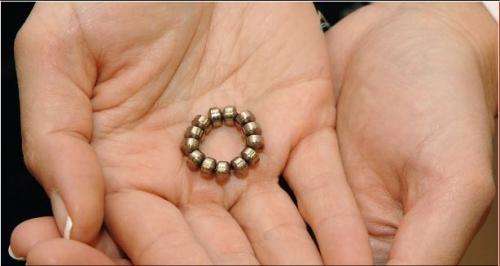Magnets help cure chronic acid reflux

Magnets are helping Cincinnati Children's Hospital Medical Center pediatric nephrologist Jens Goebel, MD, and Hoxworth Blood Center clinical lab scientist David Puckett lead healthier lives.
Without a procedure known as the LINX Reflux Management System, which uses magnets to treat chronic acid reflux, Goebel would need continuous surgery to remove growths on his vocal cords and Puckett would be taking medication to avoid discomfort that was caused by the condition.
UC Health is the only system locally offering this treatment.
"The normal human body has a barrier or valve between the esophagus and stomach—the lower esophageal sphincter—which keeps acid out of your esophagus," says Valerie Williams, MD, a member of the UC Cancer Institute, assistant professor in the department of surgery at UC and UC Health thoracic surgeon. "This barrier breaks down, and that is the main problem. It gets weaker and shorter and can be associated with a hiatal hernia.
"Medications attempt to neutralize acidic fluid that comes up into the esophagus, but they do not address the underlying mechanical problem. LINX is a ring of magnets that is placed around the bottom of the esophagus to augment the valve. At rest, the magnets are closed, and they open when you swallow allowing food to pass, mimicking a normal reflux valve."
Goebel says that after developing hoarseness, he decided to make an appointment to see UC Health otolaryngologist Sid Khosla, MD.
"He found benign growths on my vocal cords and was able to remove them," Goebel says. "However, Dr. Khosla expected them to reappear because they were likely being caused by enzymes in my stomach that were washed up into my voicebox by reflux, even though I never experienced symptoms."
After having the growths removed two or three times over the next two years, he decided to pursue a surgical solution to the reflux issue because of the risks involved with vocal cord surgery.
"I was referred to Dr. Williams who told me about LINX, and it sounded like a much better option when compared to fundoplication, the conventional surgical treatment which wraps the top of the stomach around the bottom of the esophagus," he says. "If anyone has been told surgery is needed for the treatment of their acid reflux, this procedure, which allowed me to sit at home on my porch the very same day, might be the best option."
Puckett, on the other hand, experienced painful and invasive acid reflux that sometimes left him with a bad taste in his mouth, literally.
"Sometimes, I would just get a mouth full of stomach acid," he says. "I was taking Nexium since about 2005, but I was looking for other options."
Williams says patients can get relief from medication but that about 30 percent of patients are still symptomatic despite medical management, like Puckett, and she felt that he could benefit from an operative intervention.
"Even just a few weeks out, I notice a difference," he says. "I haven't taken any medication, and I have not had any heartburn symptoms even though I'm still recovering."
"The magnetic ring does not alter normal anatomy and is reversible," Williams adds and says that patients still retain the ability to belch and vomit with the LINX. "The minimally invasive procedure takes an hour or less and allows the patient to resume a regular diet immediately following."
"The LINX is the only FDA-approved device for treatment of gastroesophageal reflux disease, or GERD. We're excited to offer this technology to patients like Jens and David and hope that this option can help patients with chronic acid reflux experience a better quality of life."
















